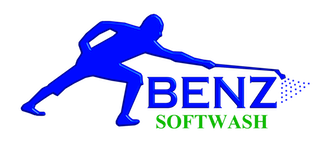
We've noticed a great deal of misunderstanding about the use of "approved" and "non-approved" softwash cleaning chemicals. Many contractors appear confused about what is legal to use and what is not.
Sometimes the attitude is "why should I care anyway?" Well, by the end of this article we hope that question will have been answered.
Understanding product approvals can seem confusing and overwhelming at first and getting to grips with the regulations a daunting prospect. But most good practices are common sense once we become familiar with the principles.
So in this post we attempt, as best we can given the immense complexity of the legislation, to simplify and clarify the situation and explain as clearly as possible what lies behind the words "government approved product".
Who are the regulatory bodies?
It's vitally important to determine if a product has Irish PRCD (Pesticide Registration and Controls Division) and UK HSE (Health & Safety Executive) approvals, is REACH (the regulations concerning the Registration, Evaluation, Authorisation & restriction of CHemicals) compliant and is registered with BPR (Biocide Products Regulation). If not there could be some serious legal implications in the event of an accident and subsequent litigation.
By choosing to use only products that are fully government approved, a contractor can be confident that they have done everything possible to assure the safety of materials and persons as regards the cleaning chemicals they use. This will stand them in good stead with the regulatory authorities in the unfortunate event of an accident.
Click here to view the government approval data for Benz Bio Cleanze & Benz Lightning Cleanze
What does "approved Use" actually mean?
It is up to the product manufacturer to make it clear to the end user what the "approved use" of their product is and how it should be used. This will be stated on the product label and on the SDS (Safety Data Sheet).
If a product does not state an approved use of, for example, "cleaning exterior hard surfaces" it cannot legally be used for that purpose.
Quick fact: Adding anything to a chemical product approved for a specific "approved use" voids that approval and is illegal
Hence the reason why using sodium hypochlorite (sh, hypo) that has been approved for disinfecting swimming pools and milking parlours is illegal when used for soft washing exterior hard surfaces after the addition of a surfactant and scent.
Quick legal tip: We have written confirmation from both the UK HSE and the Irish PRCD stating clearly in black and white that using unapproved sodium hypochlorite, and any formulation that adds unapproved substances (surfactants, scent) to unapproved sodium hypochlorite for soft washing external hard surfaces is illegal. There is no argument about this despite what some companies may attempt to claim.
Managers of large commercial buildings such as offices and warehouses know full well that if they employ a cleaning contractor who uses illegal chemicals, and someone gets hurt, they personally will be "proportionately liable".
Using government approved products is particularly important when cleaning large commercial premises and non-commercial buildings used by government and other organisations. This is because the management has a legal "duty of care" to their staff and customers.
And because of the very real threat of litigation, which can implicate the managers personally and not just their company, they cannot afford to employ contractors who use illegal products.
The legislation dates right back to the 1974 Health & Safety at Work Act and the regulations are becoming stricter year by year. For example, the Health and Safety at Work Act is underpinned by the principle of "reasonable practicability".
But in some health and safety regulations, including those arising from EU law, the duty imposed is a strict one and no defence of having done what was '"reasonably practicable" is available.
Click here to read relevant information about employer's liability on the HSE website
What is a "formulator"?
Anyone who adds a surfactant, scent, or any other additional ingredient, to unapproved sodium hypochlorite, or to a product approved for purposes other than soft washing external hard surfaces, or to a product approved for soft washing but not approved to have specific adjuvents added, will be legally classified as a formulator with all the attendant highly complex regulatory compliances that that entails and absolutely must be adhered to.
A formulator must comply with stringent, and extremely complex, legal conditions that the regulators are becoming more and more strict in enforcing
Responsibilities of the product supplier
The product supplier must ensure that there is an audit trail in the production process in which every ingredient must be compliant with the regulations. This is both complex to understand and expensive to implement. It involves mountains of paperwork and huge financial costs. For large chemical companies the costs can run into millions.
What we at Benz Softwash have done is ensure that both Benz Lightning Cleanze and Bio Cleanze are fully legally compliant with all regulations. We've done the hard work (and it really is hard work) for our customers so they can get on with running their soft washing businesses.
The vast majority of soft washing contracts can be completed using either, or both, our main products: Bio Cleanze and Lightning Cleanze. All our customers have to do is use the products according to the instructions on the labels and guidance on our website.
Thus we hope to have made a potential bureaucratic nightmare into a no-brainer decision as to which products to use. Just get on with soft washing and earning good money. We have ensured that you have no softwash chemical regulations to be concerned about, other than the Health & Safety procedures of application and storage.
Quick fact: Benz Lightning Cleanze is the only legal, government approved sodium hypochlorite based softwash biocide that is fully approved by both the Irish and UK governments and is fully label and REACH compliant.
The importance of purity
The active ingredient in Bio Cleanze is DDAC (Didecyldimethylammonium chloride). There are only five "active substance suppliers" of DDAC on the BPR (Biocidal Products Regulation) that are allowed to sell DDAC as a biocide in the whole of Europe. They are large multi-national companies.
The purity of DDAC and the actual amount contained in a finished product are important. As with sodium hypochlorite, not all DDAC is of the same quality. The purity of Bio Cleanze is guaranteed greater than 95% and is usually 98%. It is the highest quality feedstock available.
All softwash biocides are not created equal
Although as a company policy we never comment directly on products from other companies, it is important to bear in mind that all biocides are not equally effective.
For example, when creating Bio Cleanze we tested DDAC from several suppliers of DDAC. One was a 40% DDAC water-based concentrate without IPA (Isopropyl Alcohol) and in our tests we found it very weak compared to the feedstock we eventually chose for Bio Cleanze.
Another serious disadvantage of the 40% products which lack IPA, compared to Bio Cleanze's 50% DDAC, are their poor resilience to cold weather conditions.
Similarly, sodium hypochlorite feedstock varies in quality and different brands and sources have varying degrees of purity and life expectancy.
Quick fact: Benz Lightning Cleanze is the only sodium hypochlorite softwash product available in the UK and Ireland that is legally allowed to be called a biocide.
We at Benz Softwash did a great deal of research and experiential testing before deciding on the formulas we sell. We satisfied ourselves that both our DDAC biocide (Bio Cleanze) and our sodium hypochlorite biocide (Lightning Cleanze) are of the very highest quality possible.
Click here to read about Bio Cleanze DDAC biocide in more depth
Read more about how professional soft washing contractors can stay legal and safe:
Click here to learn how softwash contractors can operate legally within government regulations (Part 2)
Click here to learn why it is important for softwash contractors to be familiar with COSHH, REACH and other softwashing regulations
We hope this information is helpful and sincerely wish you great success in your soft washing business,
Benz Team
Click here to get more practical soft washing how-to tips
How to find answers to most soft washing questions: Simply enter a relevant "keyword" or short phrase – e.g. keyword for the above link = "how to" – into our in-site Search Engine (magnifying glass icon on the main menu).
Click here to download our Product Documentation Pack (includes Application & Dilution guides, SDS, PDS, RAMS, PPE & Mask info, COSSH, sample Contract and more)
Order Benz Softwash chemicals & equipment online or by phone:
GB (England, Scotland, Wales)
Phone: 0800 70 74 222
Online: www.benzsoftwash.co.uk
Ireland and other countries
Phone: 00353 214 622 978
Online: www.benzsoftwash.com
Lines open Monday - Friday, 9am – 5pm
Please note: The above numbers are for orders only (click here for tech support)
PS: Click here to set up your "Clean & Maintain" programme. After completing an initial soft wash treatment, put your customer on a "Clean & Maintain" ongoing maintenance programme. Your customers will enjoy a permanently clean property and you will enjoy a steady stream of repeat business.
This is clearly a win-win arrangement for you and your customers.



Responses
Leo Searle Hawkisn
Hi Sidney – thanks for your enquiry. The simple answer is to use Benz Biocidal Wash instead of Benz Blackwash.
Biocidal Wash does not normally discolour surfaces but if you want to be doubly sure, simply rinse the slates and tarmac immediately before and after treating the chimney.
We usually recommend Benz Biocidal Wash for cleaning roofs. Please copy and paste this link into your browser to get more information: https://www.benzsoftwash.com/pages/softwashing-cleaning-roofs
And this link will take you to the Biocidal Wash product page: https://www.benzsoftwash.com/products/benz-biocidal-wash
I hope this information was helpfui.
Cheers,
Leo
April 21, 2018
sidney murtagh
how can i spray blackwash on to a chimney without discolouring man made slats with the over flow and same with tarmac .thank sidney murtagh
April 15, 2018
Leave a comment